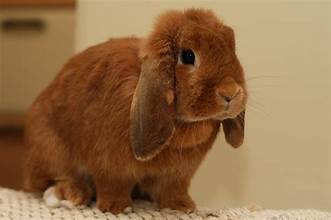Rabbits can make excellent pets for apartment dwellers, offering companionship without requiring much space. Among the many rabbit breeds, the **Holland Lop** is an excellent choice for apartment living. This breed is known for its friendly demeanor, manageable size, and low-maintenance needs. Here’s everything you need to know about caring for a Holland Lop rabbit in an apartment setting.
Why the Holland Lop?
1. Size:
Holland Lops are small, typically weighing 2 to 4 pounds. Their small size makes them easy to handle and ideal for small living spaces.
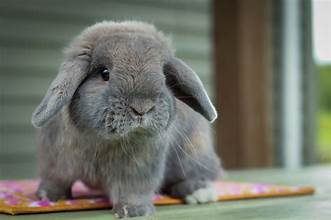
2. Temperament:
Holland lops are known for their affectionate and gentle nature. They often enjoy human interaction and can be sociable, making them great companions.
3. Adaptability:
This breed adapts well to indoor living and can be litter trained, reducing the mess and making them more suitable for apartment life.
Dietary Needs
A balanced diet is crucial for Holland Lop’s health. Here’s what they need:
1. Hay:
Hay is the primary component of a rabbit’s diet. Timothy Hay is ideal and should be available at all times. This will aid in digestion and help wear down their constantly growing teeth.
2. Fresh Vegetables:
Daily, leafy greens like romaine lettuce, kale, and parsley should be included. Avoid giving too many high-calcium vegetables like spinach.
3. Pellets:
Moderately, high-quality rabbit pellets can be given. They should be timothy-based rather than alfalfa-based.
4. Fresh Water:
Ensure your rabbit has access to fresh water. You can use a water bottle or a heavy ceramic bowl.
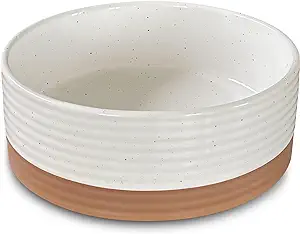
Habitat Needs
Creating a comfortable and fun environment is essential for your rabbit’s well-being:
1. Cage/Hutch:
Even if your rabbit has a free run of the apartment, choose a spacious cage or hutch. It should be large enough for them to stretch out and move around and have a separate area for a litter box.
2. Litter Box:
Rabbits can be litter trained. Use a litter box with rabbit-safe litter (avoid clay or clumping types)
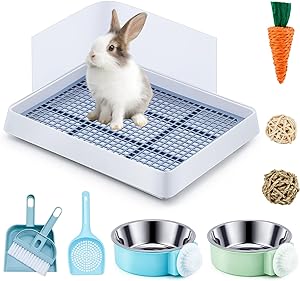
3. Bedding:
Use soft, absorbent bedding. Paper-based bedding is a good option. Clean the bedding regularly to maintain hygiene.
4. Hideout:
Provide a safe hiding place for your rabbit.
5. Toys and Chews:
Supply plenty of chew toys and safe objects to keep them entertained and help with dental health.
Health Issues
Holland Lops are generally healthy but can be prone to particular conditions:
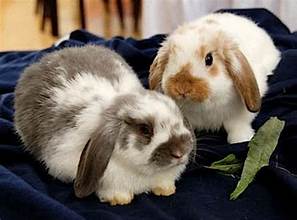
1. Dental Problems:
Overgrown teeth can cause pain and eating difficulties. Ensure they have enough hay and chew toys.
2. Gastrointestinal Stasis:
It is a potentially serious condition in which the digestive system slows down or stops. Ensure a high-fiber diet and monitor their eating habits.
3. Ear Infections:
Due to their lop ears, they are more prone to ear infections. Regularly check and clean their ears.
4. Obesity:
Monitor their diet and ensure they get enough exercise to prevent weight gain.
Exercise
Rabbits need regular exercise every day to stay healthy and happy:
1. Playtime:
Allow your rabbit several hours free-roaming in a safe, rabbit-proofed apartment area.
2. Enrichment:
Provide toys, tunnels, and climbing structures to stimulate them mentally and physically.
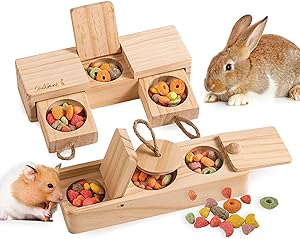
3. Interaction:
Spend time interacting with your rabbit daily. They enjoy social engagement and play.
Grooming
Grooming is an essential aspect of rabbit care:
1. Brushing:
Regular brushing helps remove loose fur and prevents hairballs. Holland Lops have dense fur, so aim to brush them at least once a week.
2. Nail Trimming:
Keep their nails trimmed to a proper length. You can learn to do this or have a vet or groomer handle it.
3. Ear Cleaning:
Check their ears regularly for signs of infection and gently clean them as needed.
4. Dental Checks:
Regularly check their teeth for overgrowth or misalignment.
Conclusion
Holland Lops make excellent pets for apartment living due to their small size, friendly nature, and adaptability. You can keep your Rabbit healthy and happy by giving it a balanced diet, a comfortable habitat, regular health checks, sufficient exercise, and proper grooming. With the appropriate care, your rabbit will be a delightful companion in your apartment for many years.

